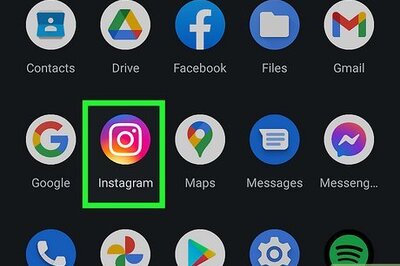
views
Finding Organic Seeds

Buy seeds from a local garden center or farm to support local growers. Many small garden centers and seed farms sell organic seeds. By purchasing your seeds locally, you'll be supporting local seed farmers. Call before you stop by or visit their website to see if they offer organic seeds. Keep in mind that garden centers and seed farms will have a limited selection of seeds to choose from. If you’re looking for rare or unique seeds, you may have a hard time finding them in person.

Get organic seeds from a mail-order catalog if you want more variety. Mail order seed catalogs are print catalogs that can feature hundreds of seed varieties. If you want to try growing something rare or exotic, you’ll have better luck getting it in a catalog than from a local seed vendor. If you’re not already subscribed to a catalog, you can sign up online to receive one in the mail. Some reputable mail-order seed catalogs you can buy from are the Burpee Catalog, the Seed Savers Exchange Catalog, and the Johnny's Selected Seeds Catalog. You may need to pay a subscription fee to get a mail-order catalog.

Purchase organic seeds online if you’re looking for convenience. Lots of online seed vendors sell organic seeds that you can have delivered right to your door. When you’re shopping for seeds on websites, just look for the organic section or check the descriptions of the seeds to see if they’re labeled “organic.” Always read reviews for online seed vendors before you buy from them to make sure they’re reputable.

Visit the Organic Seed Finder website to connect with organic seed vendors. The Organic Seed Finder website was established by the Association of Official Seed Certifying Agencies (AOSCA). On it, you can find contact information for online vendors that sell the kind of organic seeds you're looking for. You can visit the Organic Seed Finder website at http://www.organicseedfinder.org/.
Verifying That Seeds Are Organic

Look for seeds that are USDA certified organic. If a packet of seeds has a “USDA organic” label on it, that means they’re certified organic. Only seeds that were grown meeting the guidelines of the U.S. Department of Agriculture (USDA) organic certification program can have this label. If you're buying seeds outside of the U.S., look for seeds that are labeled "organic" or "100-percent organic." Keep in mind that sometimes these statements are used as a marketing tool and do not necessarily mean the seeds were grown organically. You should check that the vendor is reputable before making your purchase.

Avoid buying non-GMO seeds that aren’t organic. If seeds are labeled “non-GMO (non-genetically modified),” that doesn’t mean they’re organic. Seeds that are non-GMO may have been grown in conditions that aren’t organic. Make sure the seeds you’re buying are labeled organic and not just “non-GMO.” All certified organic seeds are also non-GMO (but not the other way around), so you don’t have to worry about choosing between the two.

Avoid seeds that are labeled as "treated." Treated seeds are not organic. Before packaging, treated seeds are sprayed or coated with different chemicals to protect them from pests, funguses, and other issues that can affect how they grow. When you’re shopping for seeds, look out for any labels that say “treated” — this a clear sign that they're not organic.

Ask the seller if you’re not sure. If you’re having trouble figuring out whether certain seeds are organic or not, the seller should be able to help you out. If you’re buying seeds in-store, ask a staff member for assistance. If you’re ordering your seeds from a catalog or website, email the vendor and ask if the seeds you’re interested in are organic. They’ll be happy to help!




















Comments
0 comment